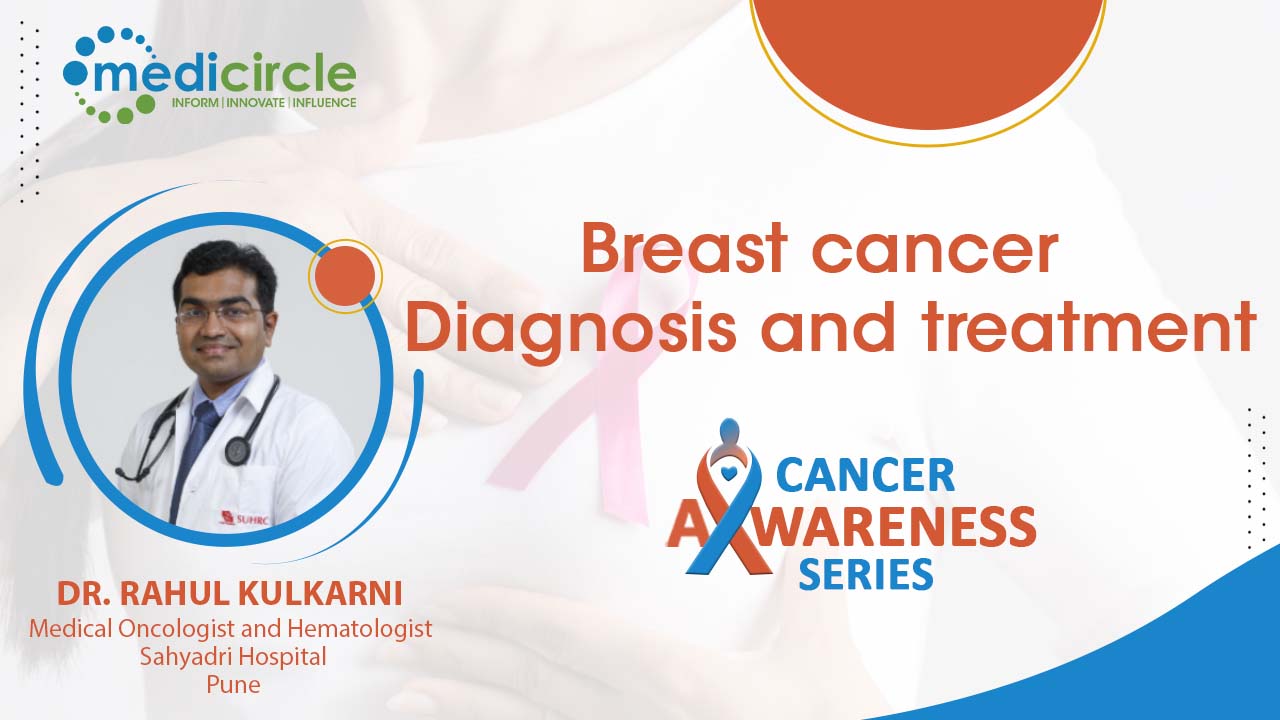Dr. Rahul Kulkarni is a renowned Medical Oncologist and Haematologist in Pune and currently practicing at Sahyadri Hospital, Pune. For the past 15 years, he has worked as a Medical Oncologist.
Breast cancer
Dr. Rahul begins, “Cancer is the abnormal growth of a cell that forms into lumps. Some cancers have got a presentation in the form of a lump, although not necessarily present in all cancer types. Cancers that generally present as a lump are breast cancer, thyroid cancer, lymphoma, or nasopharyngeal cancer. Not all lumps are cancer, many of them are benign (non-cancerous). Only those which have the potential to invade or spread to other body parts develop into cancer.
Abnormal cell growth of ducts or lobules occurs in breast cancer.”
Causes of breast cancer
Non - Modifiable risk factors
- Age – The risk of breast cancer increases with age. Most cases of breast cancer are diagnosed after the age of 50.
- Gender – More common in females.
- Family history – A woman’s risk of breast cancer increases if she has a family member on either her mother’s or father’s side who has had breast cancer.
- Personal history – Women who have had any kind of cancer earlier or have gone through radiation are more likely to get breast cancer.
- Menstrual history – Women with early menarche and late menopause have higher chances of developing breast cancer.
Non-modifiable risk factors
- Bad habits – Alcohol and smoking
- Obesity – Sedentary unhealthy lifestyle
- Post-menopausal hormonal replacement therapy – Excessive consumption of oral contraceptives
- Late marriages and late pregnancy
- Avoiding breastfeeding
Signs and symptoms of breast cancer
- Lump in the breast
- Pulling in of the nipple
- Nipple discharge other than breast milk
- Redness or flaky skin on the nipple or breast area
- Any change in the size or shape of the breast
In 2020, more than two lakh women in India were estimated to have been diagnosed with breast cancer. As per the 2020 National Cancer Registry Program Report, the number is expected to rise to more than 2.3 lakh cases in 2025.
Stages of breast cancer
It has 4 stages-
Stage I – Cancer cells are limited to the breast and the size of the lumps is also very small.
Stage II - Cancer cells are limited to the breast and the size of the lump has increased to 2-5 cm.
Stage III – Cancer cells have spread to nearby lymph nodes.
Stage IV - Cancer cells have spread to nearby and distant lymph nodes as well as distant organs.
Early detection is very important for complete treatment.
Treatment
Stage I, II, and III of breast cancer can get cured. Here cure means minimizing the chances of recurrent breast cancer.
Stage I – 90-85%
Stage II – 80-85%
Stage III – 60-75%
Stage IV – With advanced techniques, patients can live a quality life.
Treatment of breast cancer widely depends on the stages and severity of the condition. Early diagnosis and timely treatment aid in getting positive outcomes.
Treatment of breast cancer by a Medical Oncologist
First, a doctor examines and performs various tests like mammography and biopsy to verify the type of cancer, and then the patient undergoes different scans to determine the stage. Once the stage is out, treatment is planned according to it. The role of a medical oncologist starts with the diagnosis and executing the treatment plan. If the patient is in the first stage, she is referred to the surgeon for surgery, and then radiation or chemo is given. If the patient is in stages II or III, chemotherapy is given first to minimize the lump size so that surgery is performed well.
FAQs
1. Are only women affected by breast cancer?
No, incidences of breast cancer in males also occur however it is more prevalent in females.
2. Is breast cancer genetic?
15-20% of breast cancer cases are genetic. These are mostly seen in triple-negative breast cancers.
3. Does breast cancer always cause a lump?
It is one of the common symptoms, but there are other symptoms also. If you see any of the above-listed symptoms or changes in your breast, do contact your doctor immediately.
(Edited by Renu Gupta)

 In 2020, more than two lakh women in India were estimated to have been diagnosed with breast cancer. As per the 2020 National Cancer Registry Program Report, the number is expected to rise to more than 2.3 lakh cases in 2025. Let’s get a deeper knowledge of breast cancer from experts.
In 2020, more than two lakh women in India were estimated to have been diagnosed with breast cancer. As per the 2020 National Cancer Registry Program Report, the number is expected to rise to more than 2.3 lakh cases in 2025. Let’s get a deeper knowledge of breast cancer from experts.










.jpeg)

















.jpg)


